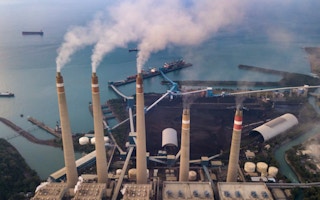Indonesia needs to focus less on the power generation sector and more on the companies that consume power as Southeast Asia’s largest greenhouse gas emitter comes under growing international pressure to decarbonise, a government official has said.
To continue reading, subscribe to Eco‑Business.
There's something for everyone. We offer a range of subscription plans.
- Access our stories and receive our Insights Weekly newsletter with the free EB Member plan.
- Unlock unlimited access to our content and archive with EB Circle.
- Publish your content with EB Premium.
The industrial sector is the “overlooked” part of Indonesia’s decarbonisation conversation, which has been dominated by the power sector and electricity generation, said Muhammad Yusrizki, chairman of the renewable energy committee at the Indonesian Chamber of Commerce and Industry (KADIN), at an event in Jakarta on Tuesday.
“We need to change the narrative,” said Yusrizki, who also chairs KADIN’s Net Zero Hub, a new unit set up to encourage Indonesian companies to reduce emissions in support of the country’s national 2060 net-zero target.
Only about a fifth of the energy consumption of Indonesia’s industrial sector comes from electricity, with most businesses relying directly on fossil fuels for heat and cooling, he said. “That is what we really need to decarbonise.”
“Decarbonisation shouldn’t just fall on PLN [Indonesia’s state electricity company]. Industry needs to step up too,” Yusrizki said.
Yusrizki was speaking at the “Cut the Tosh” Collaboration Summit, an event billed as part of a movement to promote “real action” on corporate decarbonisation. The event was co-hosted by beverage firm Multi Bintang Indonesia (MBI) and non-profit World Resources Institute Indonesia.
“
We have to do more about industrial decarbonisation.
Muhammad Yusrizki, chairman, KADIN Net Zero Hub
Heineken-owned MBI announced at the event that it is building a biomass plant west of Jakarta to help it meet its target of sourcing 100 per cent renewable energy by 2030. The plant will be powered by agricultural waste.
Yusrizki said that multinational companies with supply chains in Indonesia may be forced to look outside of the country if they cannot meet their decarbonisation targets locally. Few clean energy options exist for companies in Indonesia, and most have to buy through PLN, which recently put a cap on renewable energy intake because of grid oversupply.
“Can you imagine if a company like H&M, with a supply chain in Indonesia, cannot meet its net-zero target [because of constraints] here?” he told Eco-Business on the sidelines of the event.
Clothing firm H&M is part of a garment industry worth US$15 billion a year to Indonesia’s economy, Yusrizki said. “We will lose that if we don’t help them hit their [decarbonisation] target. Adidas, Nike and others are also under pressure to decarbonise.”
H&M has targeted 2025 to achieve net-zero emissions across its value chain.
Speaking to Eco-Business on the sidelines of the event, Anya Sapphira, H&M Indonesia’s manager for its social and environment programme, stakeholder engagement and public affairs, said the company is exploring using clean energy locally, but options are limited.
She noted that procuring clean electricity is complicated, as companies can only buy electricity through PLN, which issues renewable energy certificates (RECs) to companies in lieu of clean power. “RECs should be a last resort, not the first thing we buy,” she said.
PLN is under growing pressure to reduce Indonesia’s heavy reliance on coal, the most potent source of planet-warming emissions, ahead of the G20 Summit in Bali next month.
This week, the company announced plans to retire some of the country’s vast fleet of coal-fired power stations early, as well as increase renewable energy capacity, to help Indonesia meet decarbonisation goals.
Indonesia is targeting reaching net zero carbon emissions by 2060 and PLN has said it will retire coal plants with a collective capacity of 10 gigawatts, with financing aid from the United States and European investors.
PLN unveiled two renewable energy provision options for corporates at the Jakarta event – a floating solar power plant and biomass – to replace coal power sources.










